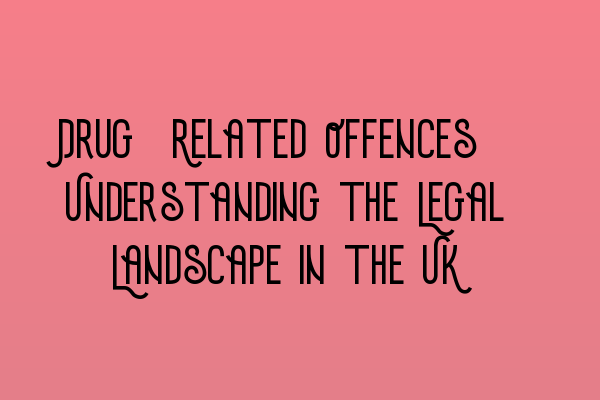Drug-Related Offences: Understanding the Legal Landscape in the UK
Welcome to SQE Criminal Law & Practice Law UK, your go-to resource for legal insights and information. In this blog post, we will explore the topic of drug-related offences and provide an in-depth understanding of the legal landscape in the UK. Whether you are a solicitor, law student, or simply interested in criminal law, this article will shed light on the complexities of drug-related offences and the associated legal proceedings.
Overview of Drug-Related Offences
Drug-related offences encompass a wide range of criminal activities involving the possession, supply, production, and trafficking of controlled substances. The UK has strict laws in place to combat the misuse and distribution of drugs, with penalties varying depending on the severity of the offence and the type of drug involved.
Understanding the different drug classifications is crucial to comprehend the legal consequences associated with drug-related offences. In the UK, drugs are categorized into three classes: Class A, Class B, and Class C. Class A drugs are considered the most harmful and attract the harshest penalties, while Class C drugs carry relatively lighter sentences.
Drug-related offences can have significant repercussions, not only on the individuals involved but also on society as a whole. The illegal drug trade fuels violence, addiction, and other criminal activities, making it essential for the legal system to take a firm stance to protect public safety.
Legal Proceedings and Penalties
When it comes to drug-related offences, the legal proceedings can be complex and multifaceted. It is crucial for solicitors and legal practitioners to have a comprehensive understanding of the relevant laws and procedures to build strong cases for their clients.
The prosecution must establish the necessary elements to secure a conviction in drug-related cases. This includes proving the accused’s possession, intent to supply, or involvement in drug production or trafficking. Expert testimonies can play a critical role in providing scientific evidence, helping to strengthen the prosecution’s case.
In the UK, the penalties for drug-related offences vary depending on various factors, including the type and quantity of drugs involved, the offender’s criminal history, and the circumstances surrounding the offence. Convictions can result in hefty fines, community service, probation, and even imprisonment.
To navigate the legal landscape effectively, aspiring solicitors must undergo rigorous training and preparation. SQE Exam Prep: Essential Study Materials for Aspiring Solicitors offers valuable resources to help individuals prepare for the Solicitors Qualifying Examination, a crucial step towards becoming a qualified solicitor.
Challenges and Success Strategies
Defending individuals accused of drug-related offences can present significant challenges for solicitors. The prosecution often relies on expert testimonies and forensic evidence to build a strong case against the defendant. Therefore, it becomes imperative for defence teams to thoroughly examine the evidence and explore every available angle to challenge the prosecution’s case.
Expert Testimonies in UK Courts: Building Strong Cases provides valuable insights into the use of expert testimonies, their admissibility, and how they can contribute to the defence strategy. Understanding the intricacies of presenting expert evidence can make a significant difference in drug-related cases.
International lawyers who wish to practice in the UK also face unique challenges when it comes to the SQE exam. SQE Exam for International Lawyers: Challenges and Success Strategies is a must-read resource that offers guidance and strategies for international lawyers aiming to pass the SQE exam and qualify as solicitors in the UK.
Conclusion
Drug-related offences present complex legal challenges in the UK. Solicitors and legal practitioners need to stay updated with the evolving legal landscape and equip themselves with the necessary knowledge and resources to effectively represent their clients.
By understanding the legal classifications, penalties, and legal proceedings associated with drug-related offences, solicitors can build strong cases and protect their clients’ rights. Demystifying the Solicitors Qualifying Examination Format is another valuable resource that provides an overview of the examination format and prepares aspiring solicitors for the challenges ahead.
At SQE Criminal Law & Practice Law UK, we are committed to providing expert insights and resources to support legal professionals and aspiring solicitors on their journey. For more legal insights, including a step-by-step guide for UK entrepreneurs on LLC formation, be sure to explore our article on LLC Formation Made Simple: Step-by-Step Guide for UK Entrepreneurs.
